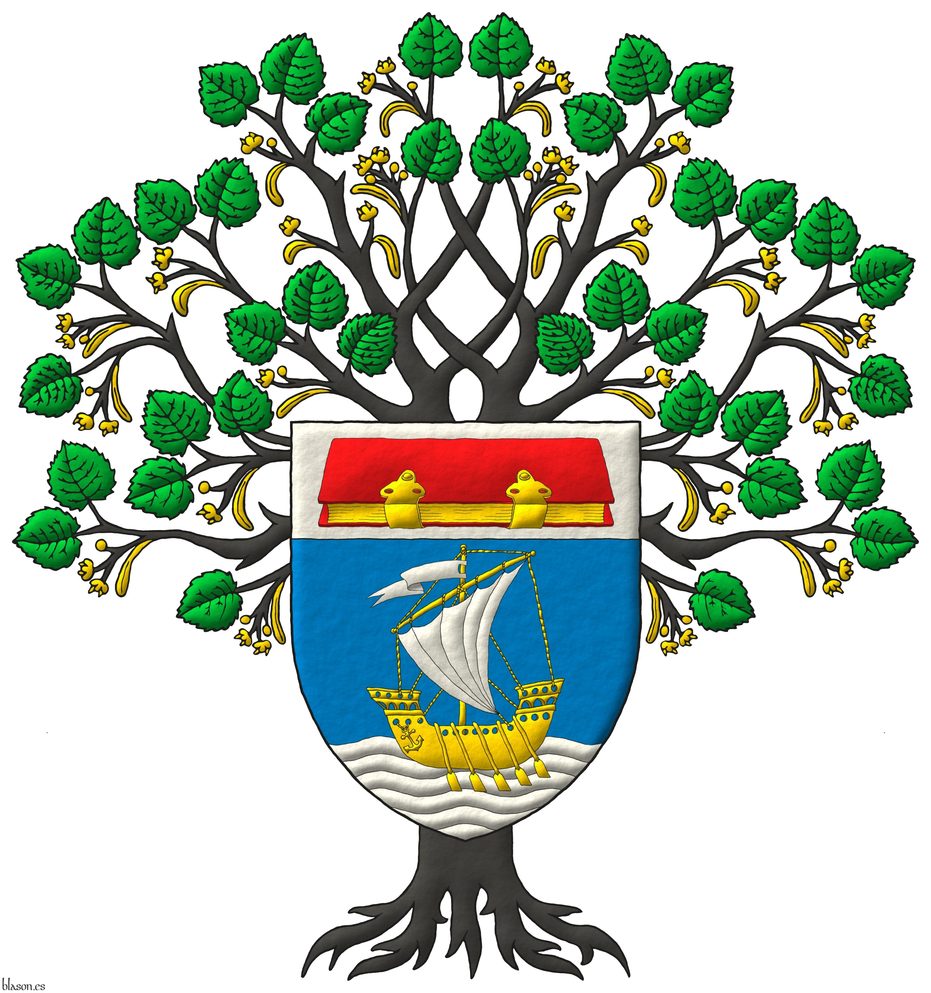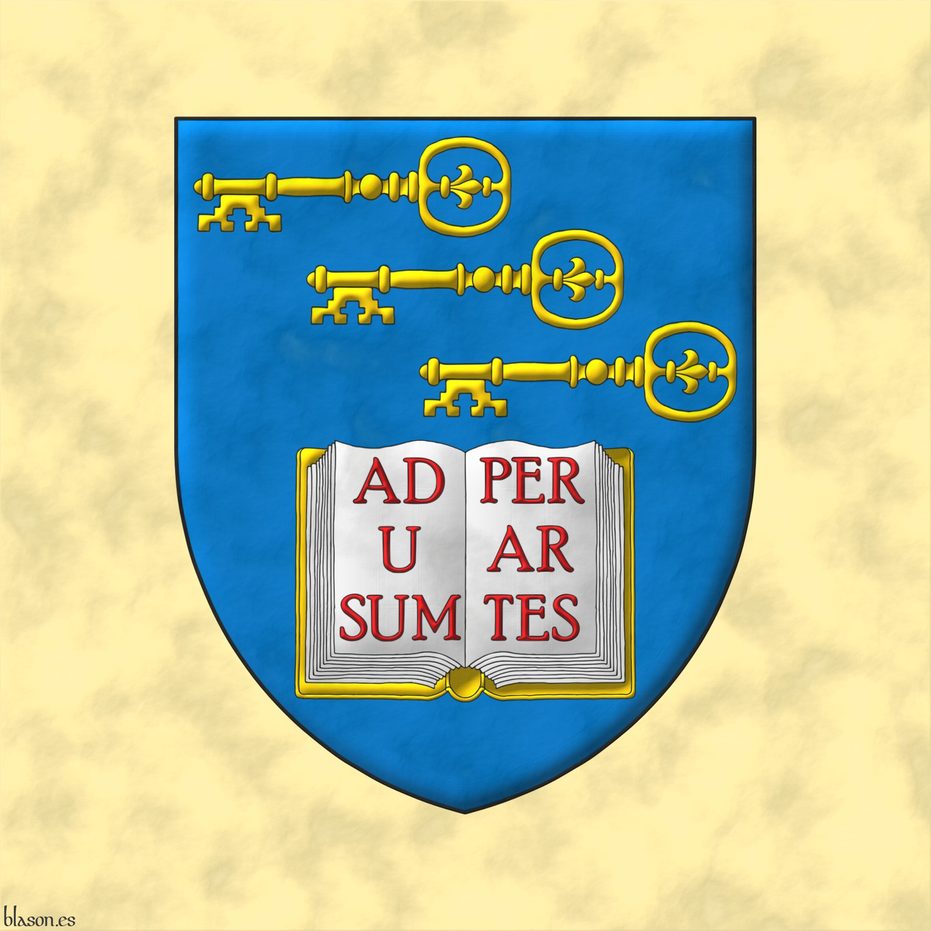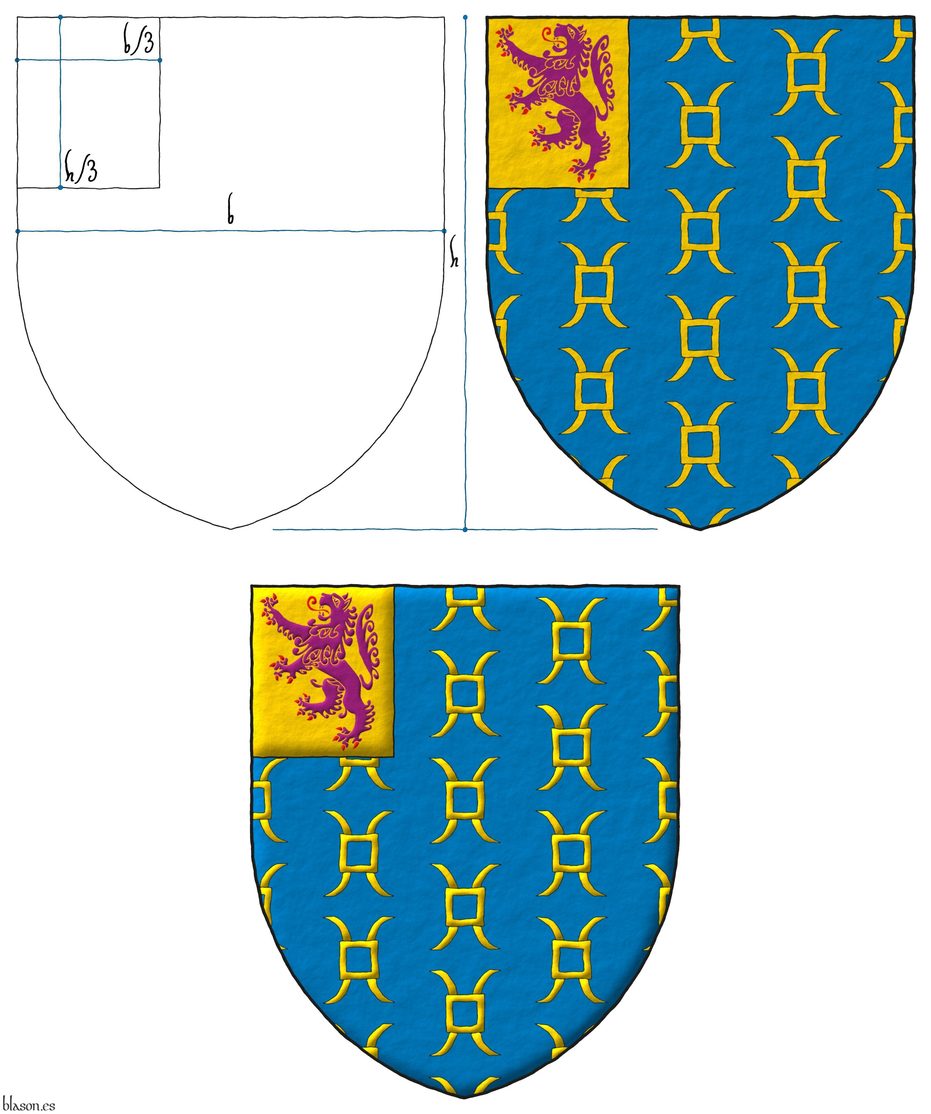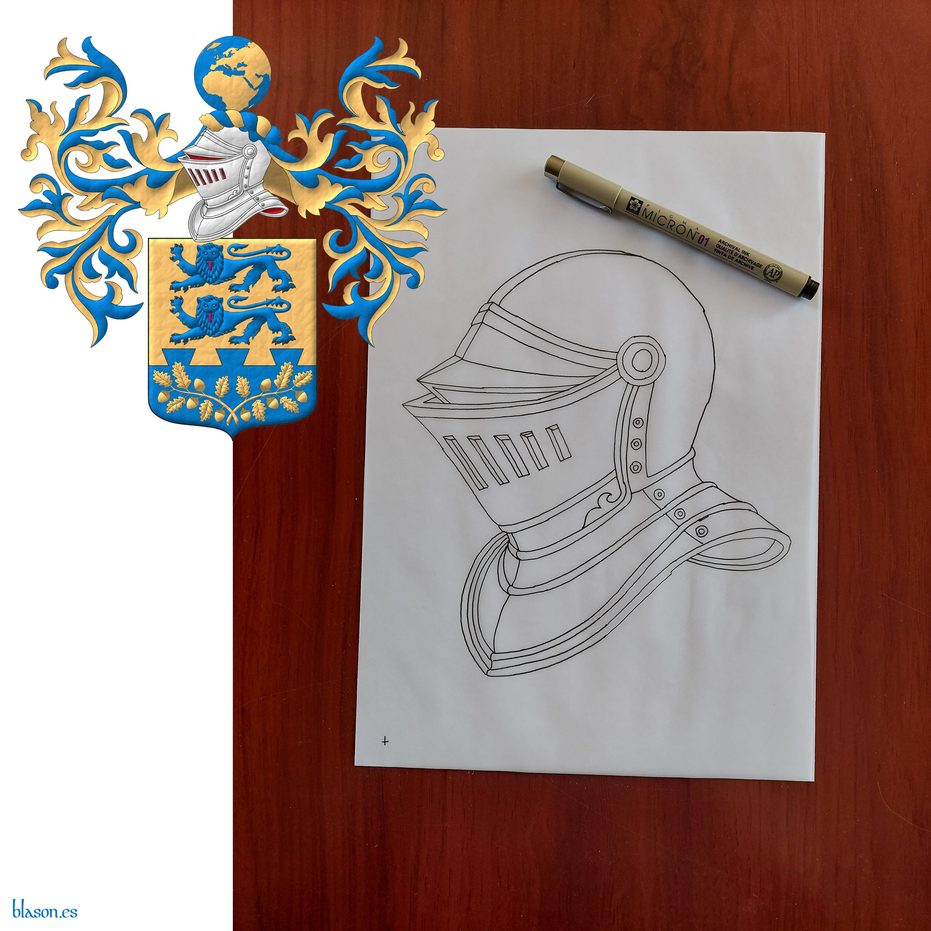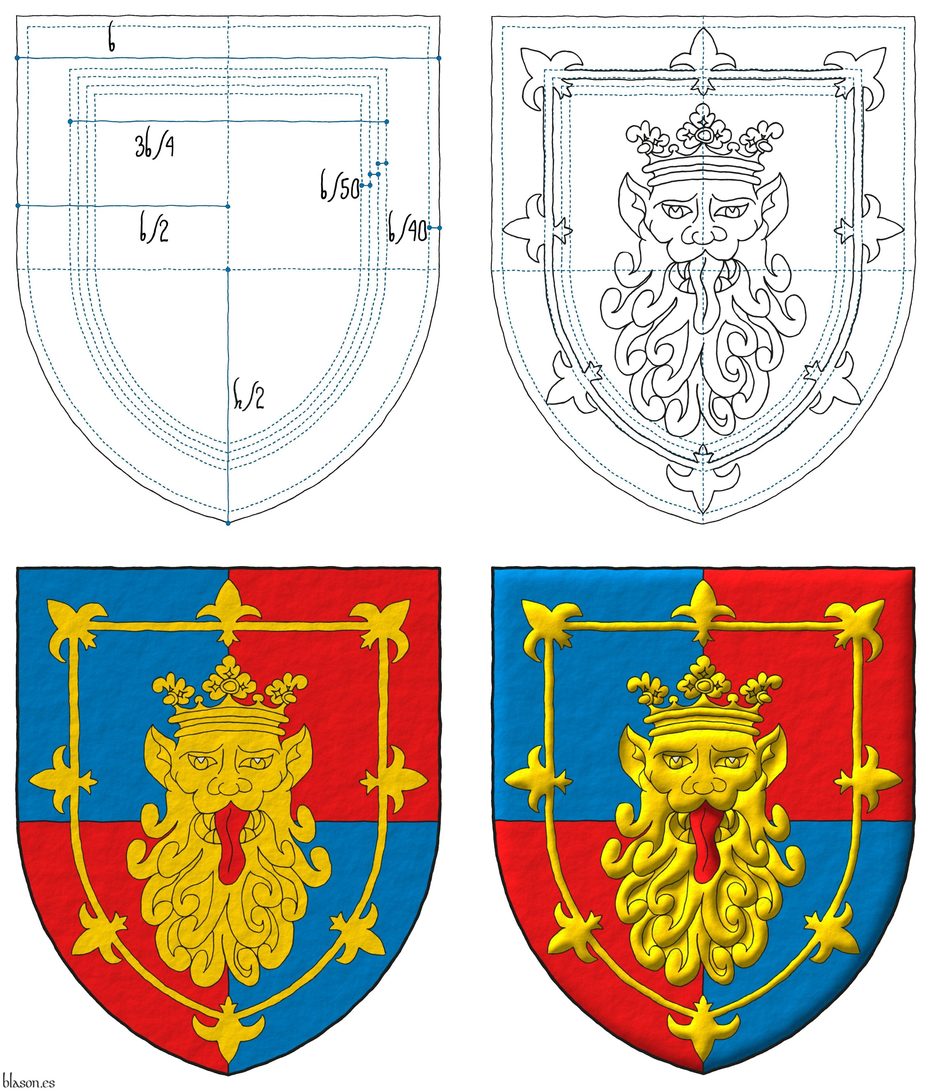Socioeconomic heraldry

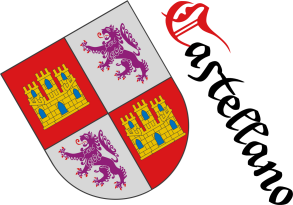
A liden behind the arms of the Strategy Department of Consultoria.IO
Azure, on waves of the sea in base Argent, a ship oars in action Or, pennant flying, and in full sail Argent; on a chief Argent, a closed book Gules, edges and clasps Or. Supporter behind the shield: A linden eradicated Sable, leaved Vert, fructed Or.
Coat of arms devised by me, illuminated with lights and shadows, with a pointed external shape and with a freehand finishing.
Blazon keywords: Azure, Argent, Or, Gules, Sable, Vert, One, Wavy, Sea, In base, On, Ship, Oar, Sail, Chief, Closed book, Book, Clasped, Supporter (thing), Supporter, Behind the shield, Linden, Eradicated, Leaved, Fructed, Motto and Scroll.
Style keywords: Illuminated, Pointed and Freehand.
Classification: Socioeconomic, Created, Boa, Coat of arms, Pennon and Flag.
Bearer: Strategy Department of Consultoria.IO.


Alea Capital
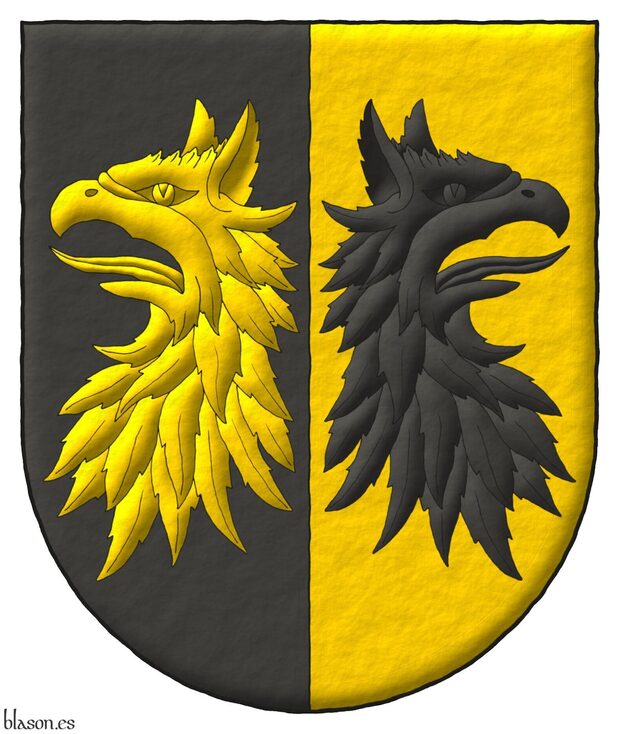
Party per pale Sable and Or, two griffins' heads eraticted, and addorsed counterchanged.
Escudo partido de sable y oro, dos cabezas de grifo arrancadas y adosadas del uno en el otro.
Coat of arms emblazoned by me with a semi-circular shape, illuminated, and with a freehand finishing.
Blazon keywords: Party per pale, Sable, Or, Two, Head, Griffin, Erased, Addorsed and Counterchanged (side-by-side).
Style keywords: Outlined in sable, Semi-circular, Illuminated and Freehand.
Classification: Socioeconomic, Created and Coat of arms.
Bearer: Alea Capital.


ANPC, emblem with shield, mottos and banners
![ANPC, emblem with shield, mottos and banners Emblem containing a [ shield de gules, una Justicia de plata, vestida de oro, en su diestra una espada de plata, alzada, guarnecida de oro y en su siniestra una balanza de oro. Crest: An open royal crown Or ]. Two banners and two mottos surround the shield.](../escudo_armas/Anpc.23.Divisa.Lema.TintaPlana.Acuarelado.jpg)
Emblem containing a [ shield de gules, una Justicia de plata, vestida de oro, en su diestra una espada de plata, alzada, guarnecida de oro y en su siniestra una balanza de oro. Crest: An open royal crown Or ]. Two banners and two mottos surround the shield.
Emblema que contiene un [ escudo de gules, una Justicia de plata, vestida de oro, en su diestra una espada de plata, alzada, guarnecida de oro y en su siniestra una balanza de oro. Timbrado de una corona real abierta ]. Dos divisas y dos lemas rodean el escudo.
The 2 banners and the 2 mottos have azure and argent letters, on argent and azure bordered in gules, they are accompanied by 3 stars, 2 smaller ones in azure and 1 larger one in argent; The banners and mottos surround the ANPC shield forming an oval; and I have executed the ensemble in flat colors and with a watercolor finish.
The 2 banners that identify the ANPC are:
- «National Association of Criminology Experts and Experts in Forensic Sciences for the Courts of Justice.».
- «ANPC».
The 2 mottos that express the fundamental motivations of the ANPC are:
- «Loyal knowledge and understanding for the Administration of Justice».
- «Forensic criminologists for the Courts of Justice».
I use the term «banner» when the purpose of the text is to identify the holder and I use the term «motto» when it expresses the holder's motivations, principles, rules, ideals, etc. This distinction is detailed further in the article: Motto, banner, device and war cry.
Blazon keywords: Without divisions, Gules, Argent, Or, Female figure, One, Justice, Vested, Dexter, Sword, Point upwards, Hilted, Sinister, Pair of scales, Crest, Open royal crown, Crown, Motto (identification) and Motto.
Style keywords: Watercolor, Plain tincture, Semi-circular and Outlined in the field tincture.
Classification: Emblem, Created and Socioeconomic.
Bearer: ANPC.


Del Fabbro Universidad
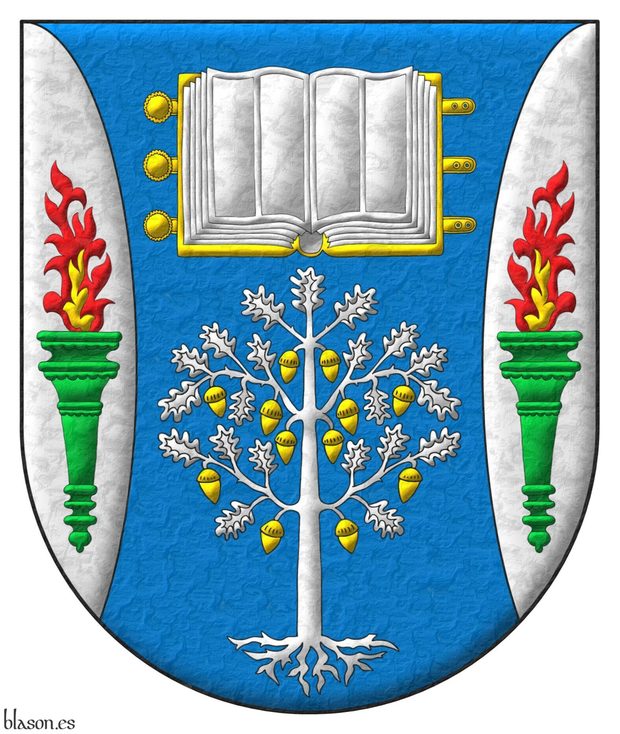
Azure, flanched Argent: in chief, an open book Argent, garnished Or; in base, an oak eradicated Argent, fructed Or; in each flank, a torch Vert, enflamed proper.
Escudo de azur, flanqueado curvo de plata: en jefe, un libro abierto de oro, hojado de plata; en punta, un roble arrancado de plata, frutado de oro; en cada flanco, una antorcha de sinople, encendida al natural.
Coat of arms devised by me, illuminated with lights and shadows, contoured in Sable, with a semi-circular outer contour and with a metal beaten finishing.
Blazon keywords: Azure, Argent, Or, Vert, One, Two, Flanched, In chief, Open book, Book, Garnished, In base, Oak, Tree, Eradicated, Fructed, In each flank, Torch, Enflamed and Proper.
Style keywords: Outlined in sable, Illuminated, Semi-circular and Metal beaten.
Classification: Socioeconomic, Created, Boa and Coat of arms.
Bearer: Del Fabbro Universidad.


![Ver [Emblem of the Society of Heraldic Arts] en instituciones citadas. Fortaleza de oro y mazonada de sable.](../css/Fortaleza.Institucion.png)
Emblem of the Society of Heraldic Arts
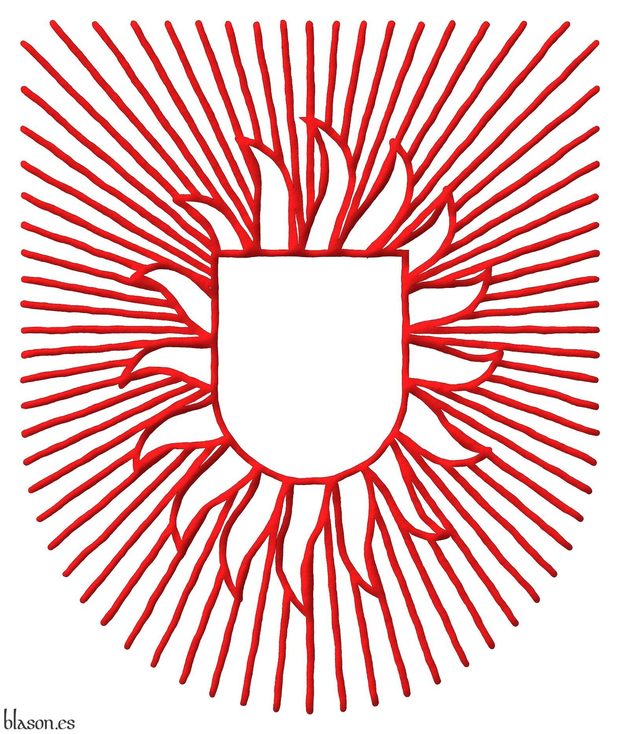
Emblem, an inescutcheon, enflamed in orle of sixteen points and irradiated throughout of sixty-four lines Gules.
Emblema, un escusón, llameante en orla de Dieciséis llamas y radiante de sesenta y cuatro líneas movientes todo de gules.
Its focus on heraldic art, along with its foundation in 1987, makes it a pioneering institution in this field on a global scale.
The Society of Heraldic Arts enjoys significant international recognition among heraldic artists, designers, and craftsmen, and its website is heraldic-arts.com.
Its members cover the full range of activities within heraldry for individuals, personal heraldry, public and private entities, socioeconomic heraldry, as well as municipalities, regions, etc., governance heraldry.
The Society of Heraldic Arts used to publish a quarterly magazine called «The Heraldic Craftsman», which was sent to all its members, but it is no longer in publication. The Society also provides advice on the correct use of heraldry to enhance corporate and personal identity.
Categories: Institution, Interpreted, Socioeconomic, Illuminated, Freehand, Semi-circular, Emblem, Gules, Inescutcheon, Enflamed, In orle, Sixteen, Flame, Irradiated, Sixty-four, Line and Throughout (all sides).
Root: Society of Heraldic Arts.


Hacienda de Triana
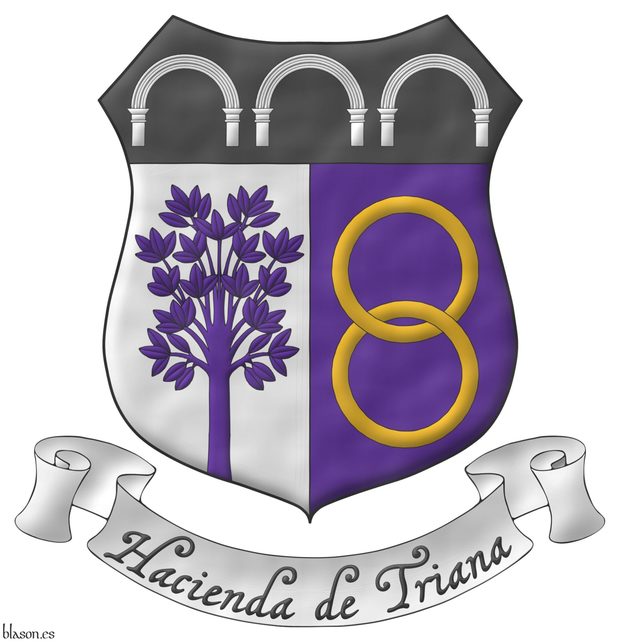
Party per pale: 1 Argent, a tree issuant from base Murrey; 2 Murrey; two annulets interlaced, in pale Or; in a chief Sable, three arches Argent. Motto: «Hacienda de Triana».
Escudo partido: 1o de plata, un árbol moviente de la punta de morado; 2o de morado, dos anilletes entrelazos, en palo de oro; en un jefe de sable, tres arcos de plata. Divisa: «Hacienda de Triana».
Arms depicted by me, highlighted with lights and shadows, with a chasuble outer contour and with a watercolor finish.
Blazon keywords: Sable, Argent, Murrey, Or, One, Two, Three, Party per pale, Tree, Issuant, Base, Annulet, Interlaced, In pale, Chief, Arch and Motto.
Style keywords: Illuminated, Chasuble and Watercolor.
Classification: Socioeconomic, Interpreted, Boa and Coat of arms.
Bearer: Triana, Hacienda de.


IESE, University of Navarra
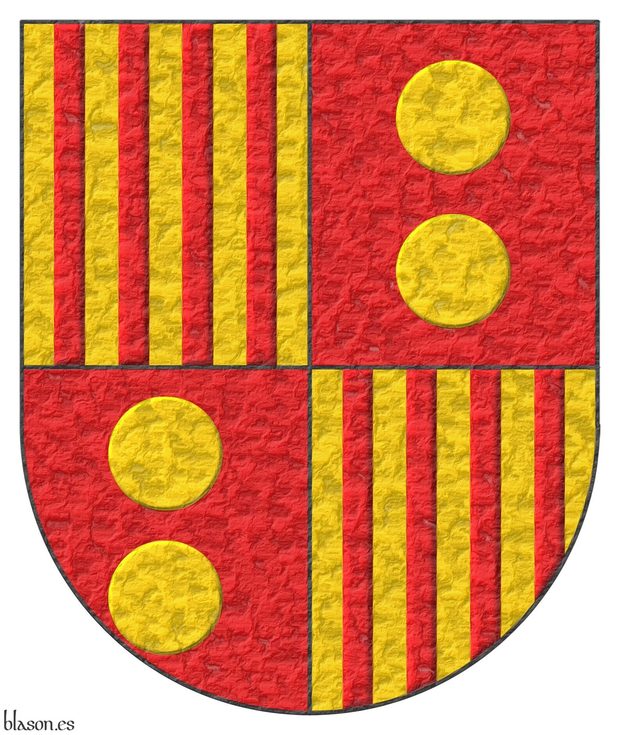
Quarterly: 1 and 4 Or, four pallets Gules; 2 and 3 Gules, two bezants in pale.
Escudo cuartelado: 1o y 4o de oro, cuatro palos de gules; 2o y 3o de gules, dos bezantes en palo de oro.
Coat of arms of IESE interpreted by me as follows: the shield has a semicircular (round) base; the field is illuminated in flat tinctures Or and Gules; the eight pales and the four bezants are illuminated in Gules and Or; and the whole coat of arms has a beaten metal finish.
IESE was founded in 1958 under the name Institute of Higher Business Studies, it is the business management school of the University of Navarra and is currently known as IESE Business School.
Blazon keywords: Quarterly, Gules, Or, Pale, Bezant and plate and In pale.
Style keywords: Semi-circular, Illuminated and Metal beaten.
Classification: Interpreted, Socioeconomic, Education and Coat of arms.
Bearer: IESE.


![Ver [Latidos Podencos] en criterios utilizados. Unicornio saltante sobre la divisa, criterio.](../css/Unicornio.Criterio.png)
Latidos Podencos
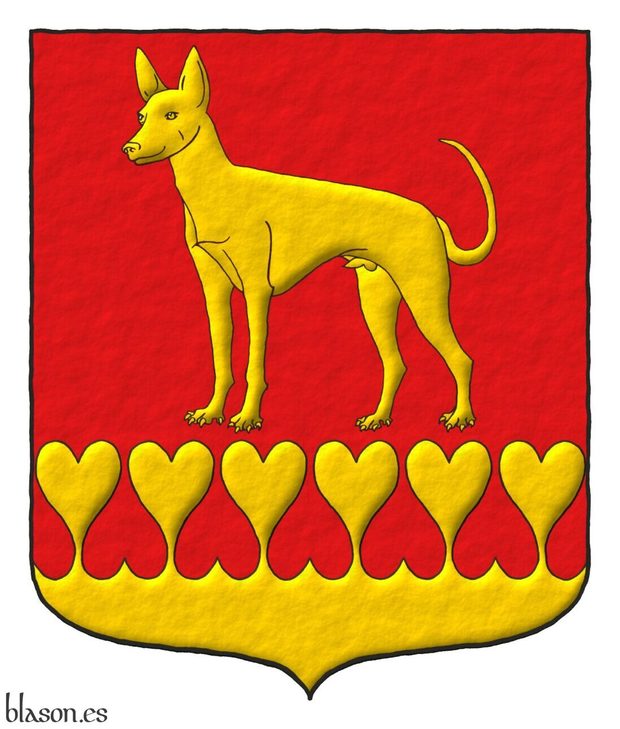
Gules: a warren hound parado statant Or; a base hearty Or.
Escudo de gules: un podenco parado de oro; la campaña encajada de corazones de oro.
Coat of arms that I have created with: the shield’s shape pointed and rounded; its field painted in flat tint gules; the warren hound and the base hearty are illuminated Or and delineated Sable; and the whole is executed in raised-line drawing.
Symbolism
A base made of generous hearts Or, interlocked with hearts Gules, red as blood, gives its support to a Spanish warren hound standing upon it. They are the hearts of those who love, protect and care for the hounds, intertwined with the hearts of the hounds whose noble heartbeats are evoked in the motto.
The founders of this Spanish warren hound shelter did not wish for a dog armed and langued, since those heraldic attributes would imply that the animal is not truly in need of protection. They preferred instead to highlight the podenco’s loyalty and faithfulness.
Types of lines of division
In English heraldry, ordinary lines of partition such as «almenado» ~ «embattled», «acanalado» ~ «invected», or «angrelado» ~ «engrailed» have well-established names. There is, however, no general rule for blazoning lines formed by repeated and more elaborate figures, such as fir trees, fleurs de lis, or other shapes.
Each case tends to receive a descriptive or newly coined term, such as «sapiné» or «flory» «flory counterflory», in these last two cases depending on whether the figures all point in one direction or alternate upward and downward.
Note that in «sapiné» the charm lies precisely in that alternation: the fir trees point alternately upward and downward, so that the figures interlock with each other.
Therefore, if a new figure appears, such as the heart in this case, with hearts pointing upward, one might say «hearty» or, more specifically, «hearty counterhearty»; but following the example of «sapiné», we shall simply blazon «hearty».
For example, the line formed by dovetail shapes, called «dovetailed» in English, is blazoned in Spanish as «encajada de colas de milano», even changing the name of the bird. Note that in this case they interlock precisely because some point upward and others downward, hence their use in joinery, cabinetry, and related arts.
In Spanish there are classical terms for the most common forms, such as «almenado», «acanalado» or «angrelado», with «encajado» ~ «dancetty» being perhaps the most characteristic, where the angles interlock alternately upward and downward.
When facing new or uncommon shapes, instead of inventing a new term we prefer to use the basic one, «encajado», adding afterwards the specific figure that forms the interlock, for example, «encajado de abetos» ~ «sapiné».
Thus, in this case we blazon «the base hearty», with the hearts alternating upward and downward, just as in the traditional «encajado» the angles alternate both ways.
Blazon keywords: Without divisions, Gules, Or, Warren hound, Dog, Base, Base (lower 1/3), Dancetty and Heart.
Style keywords: Ogee, Illuminated, Outlined in sable and Freehand.
Classification: Created, Socioeconomic, Design rationale, Criterion and Coat of arms.
Bearer: Latidos Podencos.


![Ver [Norsk Heraldisk Forening] en instituciones citadas. Fortaleza de oro y mazonada de sable.](../css/Fortaleza.Institucion.png)
Norsk Heraldisk Forening
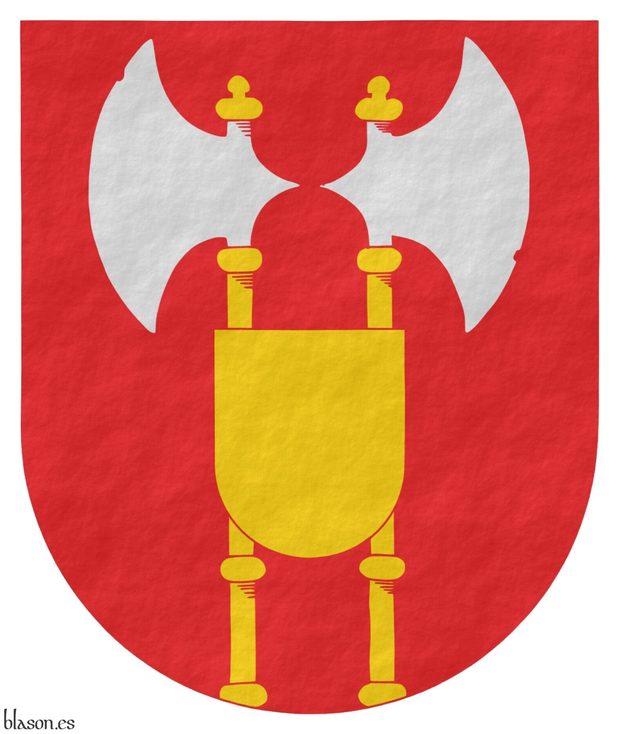
Norsk Heraldisk Forening, in English, Nordic Heraldry Society, was founded on February 27, 1969, at the National Archives in Oslo, with the aim of promoting the study and knowledge of heraldry through meetings, lectures, excursions, and other dissemination methods, and additionally, to become an advisory body to resolve issues in matters of heraldry, flags, personal coats of arms, etc. Its first president was Dr. Philos Herman L. Løvenskiold.
Since then, these have remained the objectives of the Norsk Heraldisk Forening, and its membership count has remained between 150 and 200 members, and it cooperates with the Nordic Heraldry Society, «Societas Heraldica Scandinavica».
The website's address is Heraldikk.no, its content is available in both Norwegian and English, and they work systematically to expand it and provide greater and better information to both its members and those interested in heraldry.
Blazon
Alex Maxwell Findlater described it in English, including its crest, in an article that was on their previous website under the title «About the society», as follows: «Gules issuant from base two battle-axes addorsed Argent shafted Or overall at the nombril point an escutcheon Or; for Crest between two axes of the arms a panache of three peacock feathers proper; Mantling Gules doubled Or». But given that «shafted» applies to weapons with a shaft and «hafted» to weapons with a handle, in the case of axes, I use «hafted» although both terms correspond to the Spanish «fustado».
Note how the axes are described as battle-axes, just as in the blazon of the Norwegian coat of arms, where its lion holds a battle-axe.
Coat of arms I attempted to interpret in the Norwegian style, all in flat tinctures, without Sable outlines, lighting or shading, and only with a simple rough finish.
Categories: Institution, Interpreted, Socioeconomic, Semi-circular, Plain tincture, Outlined in the field tincture, Rough, Coat of arms, Without divisions, Gules, Axe, Argent, Hafted, Or, Addorsed, Issuant from base, Overall, At the nombril and Escutcheon.


Peñafort, Universidad
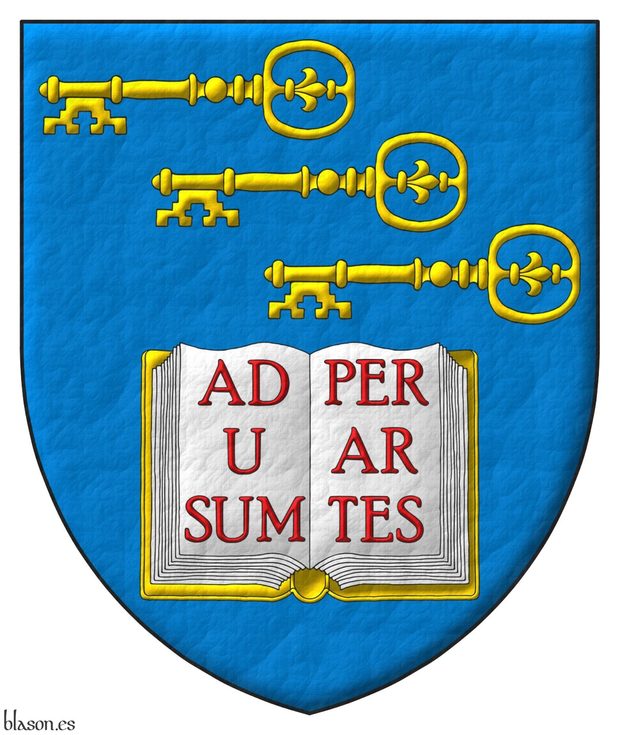
Azure, in chief three keys in bend, fesswise, to dexter, facing downwards Or, in base an open book Argent, garnished Or, the pages inscribed «Ad usum per artes» Gules.
Illuminated and a leather finishing.
This is the coat of arms of the Universidad Peñafort of Mexico. It is a Law university and its name came from Raymond of Penyafort (XIII century) who compiled the Decretals of Gregory IX, which mostly remained in use until 1917, and that is why it is the patron saint of lawyers. The symbols Raymond of Penyafort are a key and a book. This coat of arms has been designed and emblazoned by me.
Blazon keywords: Azure, Three, Key, Or, In chief, In bend, Fesswise, Book, Open and Motto.
Style keywords: Leather, Outlined in sable, Illuminated and Pointed.
Classification: Socioeconomic, Created and Coat of arms.
Bearer: Peñafort, Universidad.


![Ver [Registro Internacional de Armas Gentilicias] en instituciones citadas. Fortaleza de oro y mazonada de sable.](../css/Fortaleza.Institucion.png)
Registro Internacional de Armas Gentilicias
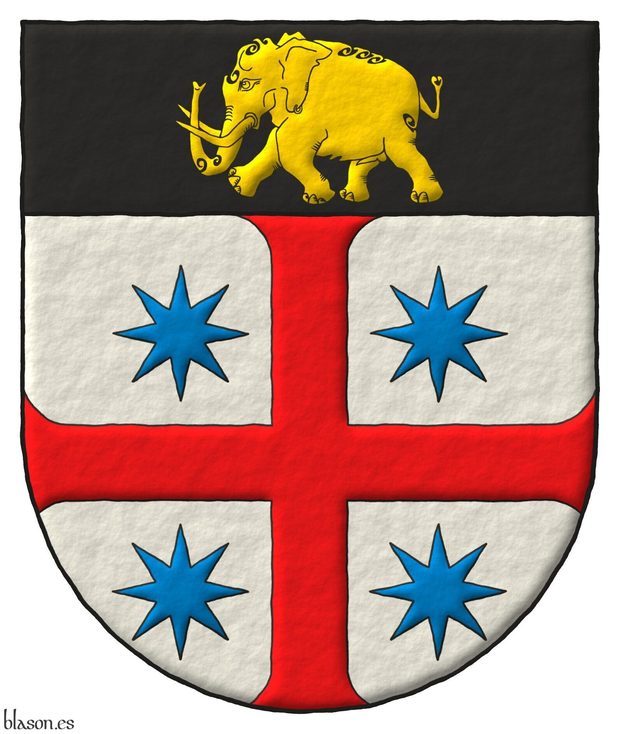
RIAG
Argent, a cross patty Gules, cantoned of four mullets of eight points Azure; on a chief Sable, an elephant passant Or.
The Registro Internacional de Armas Gentilicias, is also known as RIAG, and riag.com.es is it domain.
It is a private register of coat of arms founded in 2006 in Seville, Spain by the herald Ignacio Koblischek Zaragoza.
Categories: Institution, Socioeconomic, Semi-circular, Illuminated, Outlined in sable, Outlined in the field tincture, Freehand, Argent, Diminished cross, Patty, Gules, Cantoned, Mullet, Eight, Azure, Chief, Sable, Elephant, Passant and Or.


![Ver [Royal Association of Hidalgos of Spain] en instituciones citadas. Fortaleza de oro y mazonada de sable.](../css/Fortaleza.Institucion.png)
Royal Association of Hidalgos of Spain
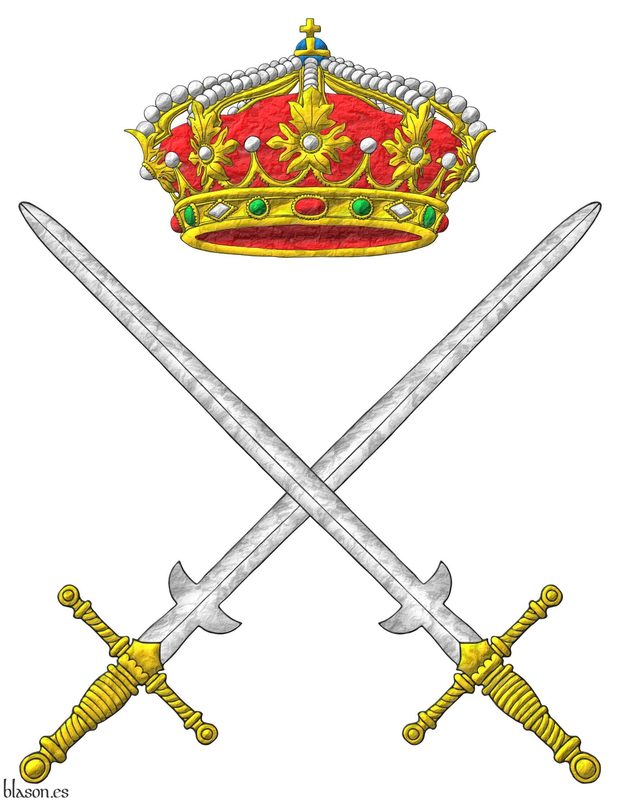
The Royal Association of Hidalgos of Spain was founded under the name «Asociación de Hidalgos, Infanzones y Noblezas a Fuero de España» by Vicente and Francisco de Cadenas y Vicent, the Marquises of Siete Iglesias and of Zayas, and also by Valentín Dávila Jalón, Marquis of Dávila.
This association brings together nobles of Spanish lineages with the aim of maintaining and promoting the traditional values of the hidalguía and is inspired by the principles of Christian humanism. It fulfills its duty to provide services to Spain, its institutions and its citizens, with loyalty to the Crown and commitment to Spanish culture and history.
Its magazine Hidalgos, also known as «La Gacetilla de Hidalgos de España», or simply «La Gacetilla», as this was its name until the end of 2010, precisely until its issue 524 of October, November and December 2010. This magazine is an excellent source of knowledge and information, and some of its articles are cited throughout Blason.es, for example, those by [Valero de Bernabé, L.; 2009b], [Valero de Bernabé, L.; 2010] and [Valero de Bernabé, L.; 2012b].
In saltire arrangements, I prefer to place the element in bend over the element in bend sinister, since the bend takes precedence over the bend sinister. Therefore, in my interpretation of this coat of arms and unlike other interpretations, the two-handed sword placed in bend is drawn above the one placed in bend sinister.
Categories: Institution, Interpreted, Socioeconomic, Illuminated, Outlined in sable, Metal beaten, Emblem, Two-handed sword, Argent, Hilted, Or, In saltire, Crest, Closed royal crown and Crown.


![Ver [Royal Council of the Orders of Chivalry] en instituciones citadas. Fortaleza de oro y mazonada de sable.](../css/Fortaleza.Institucion.png)
Royal Council of the Orders of Chivalry
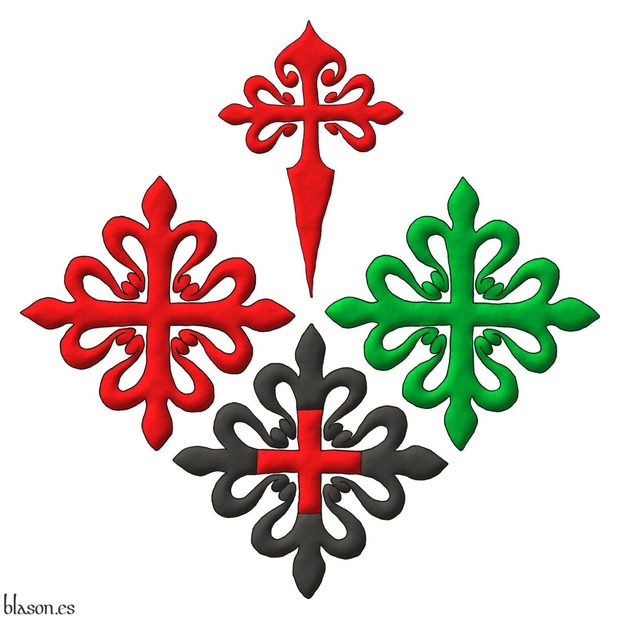
In 1523, the Order of Santiago, the Order of Calatrava, and the Order of Alcantara were definitively incorporated into the Crown of Castile, which marked the consolidation of the Royal Council of the Orders of Chivalry of Santiago, Calatrava, Alcantara, and Montesa. However, it is known that this Royal Council already existed at the beginning of the same 16th century, or even earlier, although there are no foundational documents available to date its inception.
The internet address of its website is ordenesmilitares.es where it also hosts the pages dedicated to each of its four orders:
- Order of Chivalry of Santiago: ordenesmilitares.es/orden-de-santiago.
- Order of Chivalry of Calatrava: ordenesmilitares.es/orden-de-calatrava.
- Order of Chivalry of Alcantara: ordenesmilitares.es/orden-de-alcantara.
- Order of Saint Mary of Montesa and Saint George of Alfama: ordenesmilitares.es/orden-de-montesa.
After the Crusades ended and following the model of the military orders created in the Holy Land, European kings established Orders of Chivalry, many of which were military and religious institutions, like the four grouped under this Royal Council.
Categories: Institution, Interpreted, Socioeconomic, Illuminated, Outlined in sable, Freehand, Emblem, Cross, Quarterly per saltire, Cross of Saint James, Cross couped, Cross of Calatrava, Cross of Alcantara and Cross of Montesa.


![Ver [Royal Spanish Academy] en instituciones citadas. Fortaleza de oro y mazonada de sable.](../css/Fortaleza.Institucion.png)
Royal Spanish Academy
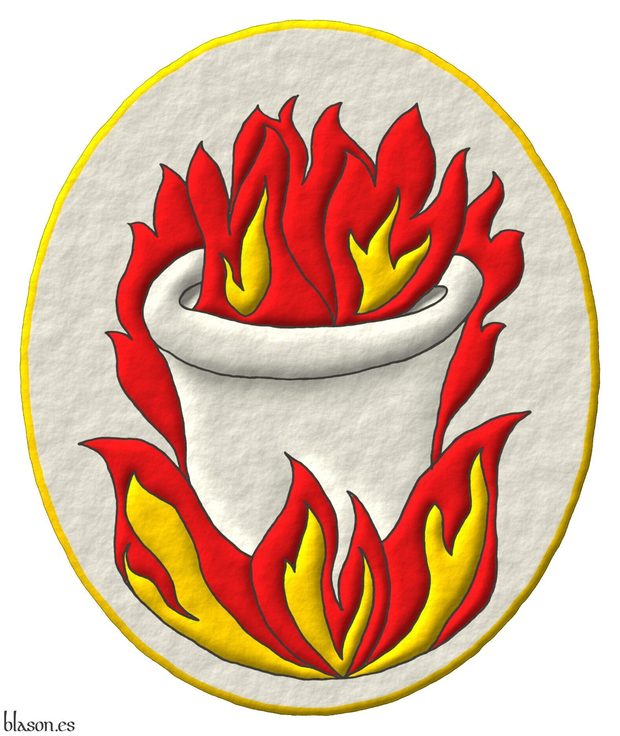
Emblem of the Royal Spanish Academy
Emblemb Argent, a crucible Argent, enflamed and on a bonfire hoguera Gules and Or.
Emblema de plata, un crisol de plata, llameante y sumado a una hoguera de gules y oro.
Painted by me with a raised-stroke finish, with an oval shape and with a thin golden edge around it which is purely ornamental.
The Royal Spanish Academy, also known by its acronym RAE, is made up of 46 full members, all elected for life to occupy seats designated by letters of the Spanish alphabet.
In addition to the full members, the Royal Spanish Academy also has corresponding members and other associated members, which completes its structure as the main regulatory institution of the Spanish language.
Categories: Institution, Interpreted, Socioeconomic, Oval, Illuminated, Outlined in sable, Freehand, Emblem, Without divisions, Argent, One, Crucible, Enflamed, Bonfire, Gules and Or.


![Ver [Socioeconomic heraldry] en criterios utilizados. Unicornio saltante sobre la divisa, criterio.](../css/Unicornio.Criterio.png)
Socioeconomic heraldry
Within socioeconomic heraldry, I classify the arms of all collectives not included in the previous categories, such as, for example, commercial societies, which may represent companies, their brands, and products, sports clubs and federations, associations, professional colleges, educational institutions, arms granted or assumed collectively, etc.
For example, the coats of arms of universities, both private and public, belong to this category, the former naturally and the latter considering their appropriate autonomy from state powers. In this way, the coat of arms of the IESE, as a business school, is an example of socioeconomic heraldry.
Also included are the coats of arms of associations, like the Norsk Heraldisk Forening, and of companies, such as the arms of Alea Capital.
This category partially coincides with what [Cadenas y Vicent, V. de; 1975; page 119] refers to as «representative heraldry».
Categories: Criterion and Socioeconomic.


Sovereign and Most Noble Order of the Pomegranate
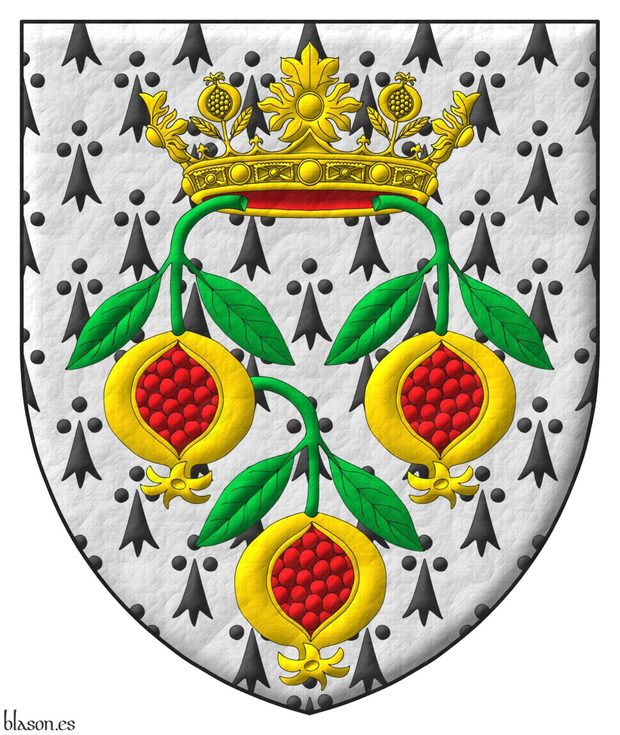
Ermine, three pomegranates inverted Or, seeded Gules, slipped and leaved Vert, ensigned with an open crown, alternating four rosettes of acanthus leaves, visible three, and four pomegranates Or, visible two, lined Gules.
Blazon keywords: Without divisions, Ermine, Three, Pomegranate, Reversed, Or, Seeded (pomegranate), Gules, Slipped, Leaved, Vert, On, One, Crown, Alternately, Four, Rosette of acanthus leaves, Visible, Two and Lined.
Style keywords: Outlined in sable, Pointed, Illuminated and Leather.
Classification: Socioeconomic, Interpreted and Coat of arms.
Bearer: Granada, Soberana y Muy Noble Orden de la.


Technical University of Madrid
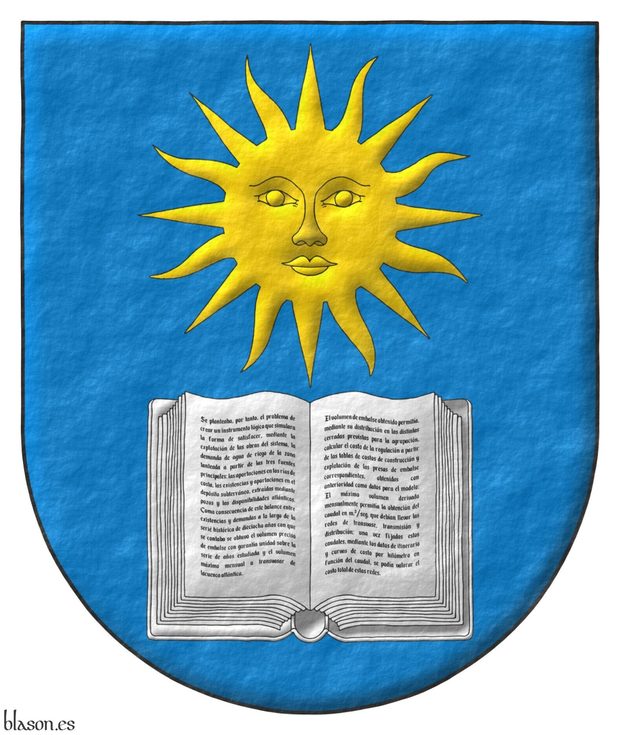
UPM
Azure, in base an open book Argent, in chief a sun in splendour Or.
Escudo de azur, un libro abierto de plata surmontado de un sol de oro.
Coat of arms interpreted with the following features: the base is semicircular (round); the field and charges are illuminated in the tinctures Azure and the metals Argent and Or, all outlined in Sable; unlike other variants the sun’s rays are not black sino de oro y el texto politécnico del libro es legible; y the whole finished with a rough-paper texture.
For my interpretation of this coat of arms, the text I have chosen to write on the pages of the open book is taken from [Cuena Bartolomé, J.; 1968; page 417, section 2, paragraphs 2o, 3o y 4o], which begins with the phrase «Se planteaba», a phrase very characteristic of José Cuena Bartolomé.
He elegido estos paragraphs porque son de José Cuena, 1937-1999, Professor of Computer Science and Artificial Intelligence at the Technical University of Madrid (UPM), who was my teacher and PhD supervisor, because in them are combined hydraulics, the use of the computer, mathematical simulation models, economic cost considerations, data in the form of time series, the underground, the oceanic, irrigation,... and, therefore, they combine various branches of engineering and study topics from many of them, such as civil engineering, computer engineering, agricultural engineering,... Additionally, as this text is almost half a century old, it is technically historical, no longer at risk of obsolescence, a risk that more recent texts would indeed have.
Blazon keywords: Without divisions, Azure, Argent, Or, Book and Sun in splendour.
Style keywords: Semi-circular, Illuminated, Outlined in sable and Rough.
Classification: Interpreted, Socioeconomic and Education.
Bearer: Technical University of Madrid.


The American College of Heraldry, blazon
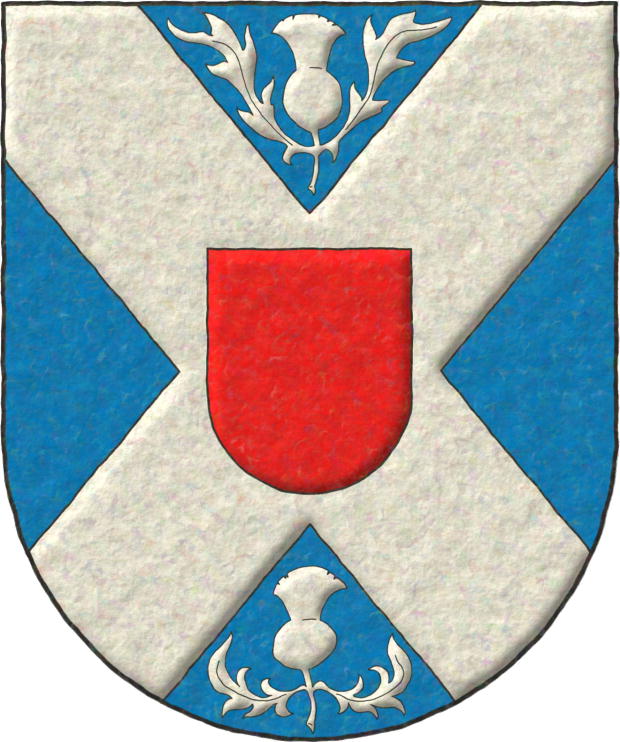
Azure, a saltire between, in chief and in base, two thistle couped Argent; an inescutcheon Gules.
Escudo de azur, un sotuer acompanado, en jefe y en punta, de dos cardos de nuridos todo de plata; un escusón de gules.
Coat of arms interpreted with the following characteristics: the shape of its shield is semicircular; the field is a flat tint of Azure; the two thistles and the saltire are illuminated of the metal Argent and outlined in Sable; the inescutcheon is illuminated of the colour Gules and, also, outlined in Sable; and the whole with a mother-of-pearl finish with a raised stroke.
Inescutcheon ~ escusón
The English term «inescutcheon» corresponds to our Spanish term «escusón». It is called an inescutcheon when there is only one and it is placed in the abyss of the shield.
Escutcheon ~ escudete
The English term «escutcheon» corresponds to our Spanish term «escudete». It is used when there are several, for example, 3. Although in this case there is only one, this is the term used in the official blazon of this coat of arms, as will be seen below.
Thistle ~ cardo
This coat of arms of The Heraldry Society of Scotland was registered and granted ~ «granted» on 7th September 1977, by «The Court of the Lord Lyon», which is the official college of arms for Scotland, lyon-court.com, with the following blazon: «Azure, on a saltire argent between two thistles slipped argent, one in chief and one in base, an escutcheon gules» and it contains 2 thistles, which is the national flower of Scotland, and a saltire Argent on an Azure field, like the flag of Scotland.
Slipped ~ nurido
The usual way of representing the thistle ~ «thistle» in Castile is with its roots visible, it is called «arrancado». In this case the stem is cut and its roots are not visible, it is called «slipped» ~ «nurido».
Blazon keywords: Without divisions, Azure, Saltire, Argent, Thistle, Couped (tree), In chief, In base, Inescutcheon and Gules.
Style keywords: Illuminated, Outlined in sable, Iridescent (nacar), Freehand and Semi-circular.
Classification: Interpreted, Socioeconomic and Coat of arms.
Bearer: The Heraldry Society of Scotland.


The coat of arms of The Honourable Society of Lincoln's Inn in 3 steps
Azure semé of millrinds Or; on a dexter canton Or, a lion rampant Purpure, armed and langued Gules.
Coat of arms of The Honourable Society of Lincoln's Inn emblazoned by me in 3 steps: initial geometric scheme, colors and metals, and lights and shadows.
Blazon keywords: Azure, Semé, Millrind, Or, One, Canton, Dexter, Lion, Rampant, Purpure, Armed, Langued and Gules.
Style keywords: Pointed, Outlined in sable, Outlined in the field tincture, Plain tincture, Illuminated and Freehand.
Classification: Socioeconomic, Interpreted, Coat of arms and Schema.
Bearer: Lincoln's Inn, The Honourable Society of.


The hand-painted helm of the Family Promet coat of arms
Or, two lions passant, guardant in pale Azure, armed Sable, langued Gules; in a base dovetailed Azure, two oak branches, leaved, fructed in pile Or. Crest: Upon a helm with a wreath Or and Azure, a terrestrial globe Azure, the continents Or, visible Europe. Mantling: Azure doubled Or.
Coat of arms of the family Promet, founders and owners of Promet Restoration, Seattle, Washington, USA. This coat of arms has been designed by Dakota Promet and me, and emblazoned by me. The image combines a photograph of a drawing of a helm along with their arms, all painted by me.
Blazon keywords: Or, Azure, Two, One, Leopard, In pale, Langued, Armed, Base, Dovetailed, Oak, Tree, Branch, Leaved, Fructed, In pile, Crest, Upon (wreath), Helm, Wreath, Terrestrial globe and Mantling.
Style keywords: Outlined in sable, Illuminated and Ogee.
Classification: Socioeconomic, Created, Boa, Hand-drawn, Collage and Photographic.
Bearer: Promet, family.


The Heraldry Society, schema
The coat of arms of The Heraldry Society emblazoned by me in 4 steps: 1) ratios, 2) delineation, 3) plain tincture, and 4) lights and shadows. Blazon: Quarterly Azure and Gules; overall a leopard face, crowned Or, langued Gules, within a tressure flory Or.
Blazon keywords: Quarterly, Azure, Gules, Overall, Head, Leopard, Crowned, Or, Langued, Within, Tressure and Flory.
Style keywords: Pointed, Illuminated, Outlined in sable, Shaded and Freehand.
Classification: Interpreted, Socioeconomic, Coat of arms and Schema.
Bearer: The Heraldry Society.


Trading Pro School
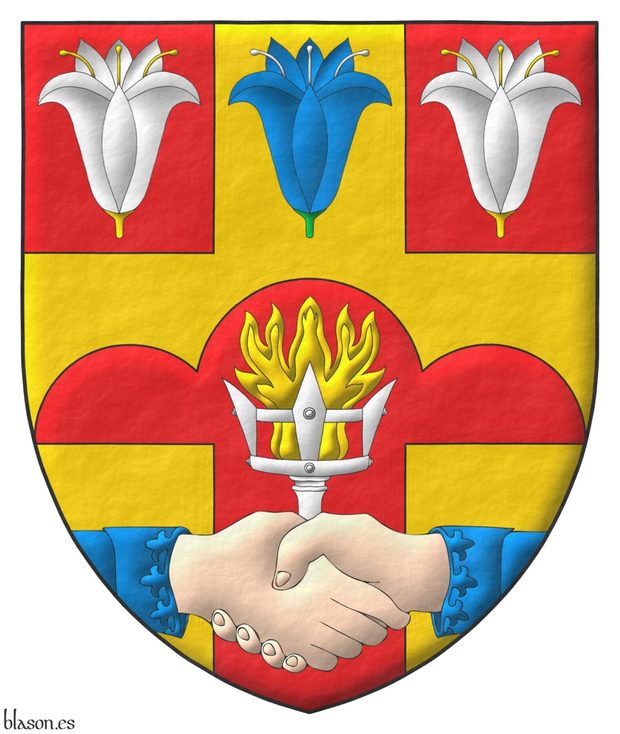
Illuminated and a rough finishing.
Blazon keywords: Gules, Cross, Or, Lily, Slipped, Seeded, Argent, Azure, Vert, In chief, Charged, Trimount, Counterchanged, Torch, In base and Two hands clasped.
Style keywords: Rough, Outlined in sable, Illuminated and Pointed.
Classification: Socioeconomic, Created and Coat of arms.
Bearer: Trading Pro School.


UBU
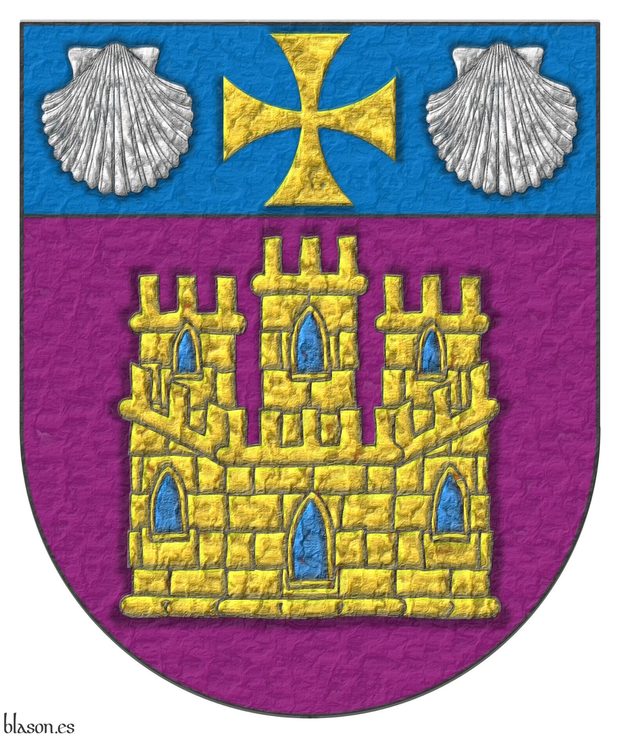
Purpure, a castle triple-towered Or, port and windows Azure, masoned Sable; on a chief Azure, a cross patty Or, between two escallops Argent.
Escudo de púrpura, un castillo de oro, aclarado de azur, mazonado de sable; un jefe de azur, cargado de una cruz patada de oro acompañada de dos veneras de plata.
Coat of arms interpreted as follows: with a semicircular (round) base; the field and the chief in the flat tinctures Purpure and Azure, with a lightly-hammered metal finish; and the four charges outlined in Sable, shaded, illuminated, and with a very hammered metal finish.
I hold the University Specialist degree in Real Estate Management and Administration, awarded by the Department of Private Law of the University of Burgos. These studies are structured over three academic years and are pursued online in combination with periods of traditional classes in the summers and on-site examinations during the winters. This was my first long-term online training experience.
Blazon keywords: Purpure, Or, Azure, Sable, Argent, Castle, Chief, Cross, Cross patty, Cross couped and Escallop.
Style keywords: Semi-circular, Illuminated, Shaded, Outlined in sable, Soft metal and Hard metal.
Classification: Interpreted, Socioeconomic and Education.
Bearer: Burgos, University of.


UNAV
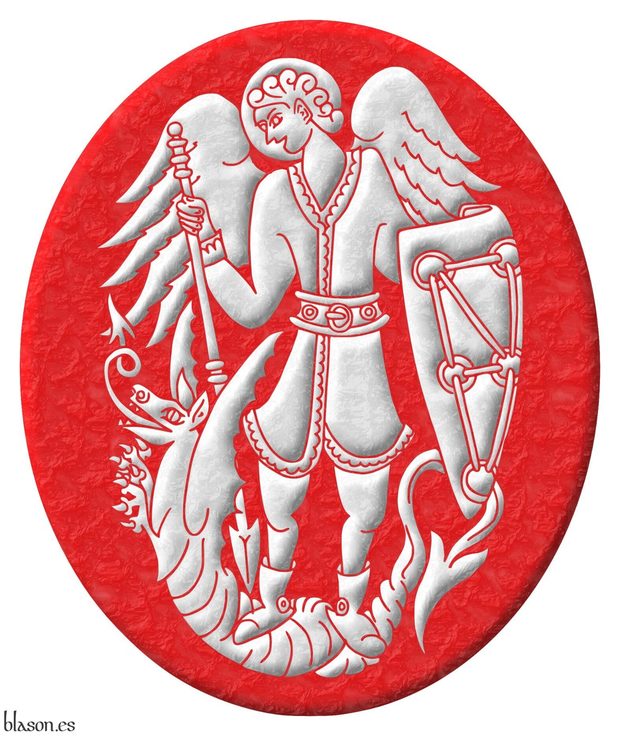
Emblem Azure, Saint Michael, grasping in his dexter hand a spear, point downward, and in his sinister hand bearing a coat of arms, upon a dragon Argent.
Emblema de azur, un Arcángel Miguel, teniendo en su diestra una lanza, con la punta hacia abajo y en su siniestra un escudo, sostenido por un dragón, todo de plata.
Two tinctures emblem interpreted as follows: an oval shape with a 5x6 proportion; the field illuminated in Gules, unlike its original colour; all its charges illuminated in Argent and outlined in the colour of the field; and the finish is marble-like.
The IESE Business School, where I studied, is the business school of the University of Navarre.
I also have the honour of having collaborated for years with the University of Navarre.
Blazon keywords: Without divisions, Gules, Male figure, Angel, Archangel, Argent, Grasping, Dexter, Spear, Point downwards, Sinister, Upon and Dragon.
Style keywords: Oval, Illuminated, Outlined in the field tincture and Marmoreal.
Classification: Interpreted, Socioeconomic, Education, Emblem and Kingdom of Navarre.
Bearer: University of Navarra.


Val'Quirico over Chinapieria
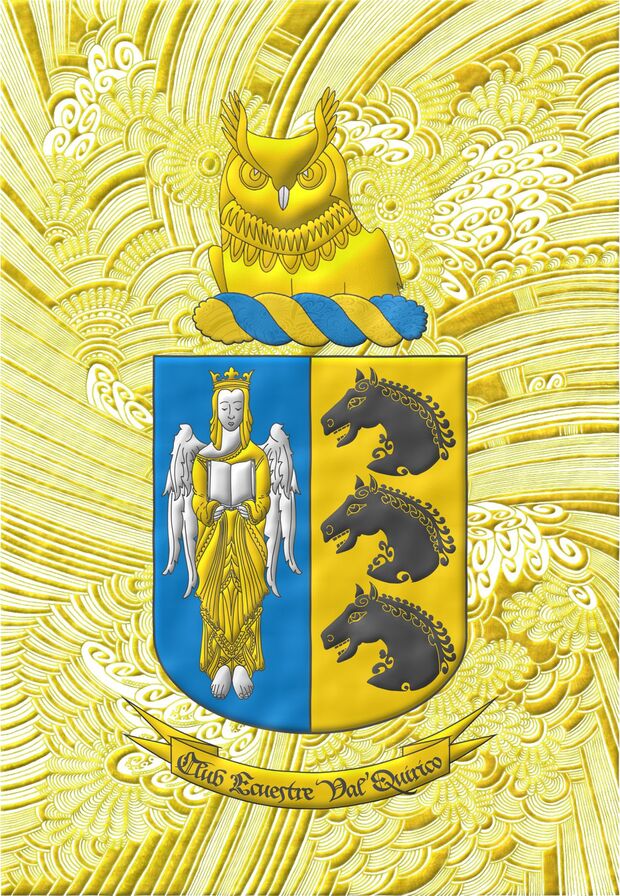
Party per pale: 1 Azure, an angel Argent, crowned, crined and vested Or holding an open book Argent; 2 Or, three horses' heads couped, in pale Sable. Crest: Upon a wreath Or and Azur, an owl's head couped at the shoulders Or, beaked Argent. Motto «Club Ecuestre Val’Quirico».
Watercolor finish over a Chinapieria Or.
Blazon keywords: Party per pale, Azure, One, Angel, Argent, Crowned, Crown, Crined, Vested, Or, Charged, Book, Open, Three, Head, Horse, Sable, Couped, In pale, Crest and mantling, Wreath, Owl, Nascent, Beaked and Motto (identification).
Style keywords: Watercolor, Illuminated, Rounded, Outlined in the field tincture, Outlined in sable and Chinapieria.
Classification: Created and Socioeconomic.
Bearer: Club Ecuestre Val'Quirico.
-
Language
-
Categories of heraldry
-
Divisions of the field
- Without divisions
- Party per pale
- Party per fess
- Party per bend
- Party per bend sinister
- Tierce
- Tierce sinister
- Tierced per pale
- Tierced per fess
- Tierced per bend
- Tierced pallwise inverted
- Quarterly
- Quarterly per saltire
- Gyronny
- Party per fess, the chief per pale
- Party per pale, the sinister per fess
- Party per fess, the base per pale
- Party per pale, the dexter per fess
- Chapé
- Chaussé
- Embrassé
- Contre-embrassé
- Party per chevron
- Enté
- Enté en point
- Flanched
-
Metals
-
Colours
-
Furs
-
Other tinctures
-
Ordinaries and sub-ordinaries
-
Diminutives of the ordinaries
-
Geometric charges
-
Composite ordinaries
-
Inanimate charges from Nature
Atom, Crescent, Diamond, Emerald, Estoile, Increscent, Lightning flash, Moon, Mount, Mullet, Mullet of four points, Orbital, Plough of Ursa Major, Rainbow, Ray of the sun, River, Sea, Snowflake, Sun, Sun in splendour, Sun of May, Terrestrial globe, Trimount, Water and Wave.
-
Vegetal charges from Nature
Acorn, Apple, Apple tree, Ash, Bluebonnet, Camellia, Chrysanthemum, Cinquefoil, Cornflower, Dogwood flower, Double rose, Eguzki-lore, Elm, Fleur de lis, Flower, Gourd, Holm oak, Hop cone, Indian paintbrush, Kapok tree, Laurel, Lily, Linden, Lotus flower, Madonna lily, Mexican cedar tree, Oak, Olive tree, Palm tree, Plantain plant, Pomegranate, Poplar leaf, Rose, Shamrock, Sunflower, Thistle, Tree, Tulip, Vine and Wheat.
-
Animal charges from Nature
Badger, Bald eagle, Barbel, Barn owl, Bear, Beaver, Bee, Beetle, Bighorn sheep, Binson, Blackbird, Boar, Brach hound, Bull, Cow, Doe, Dog, Dolphin, Dove, Eagle, Elephant, Falcon, Female figure, Fish, Flame, Fly, Fox, Frog, Goat, Goldfinch, Goose, Heron, Horse, Hummingbird, Jaguar, Lark, Leopard, Lion, Lion passant, Lion rampant guardant, Lioness, Lynx, Male figure, Martlet, Merino ram, Owl, Panther, Parrot, Peacock, Pelican, Pelican in her piety, Pronghorn, Puffin, Quetzal, Raven, Roe deer, Rooster, Savage, Seagull, Serpent, She-wolf, Stag, Starling, Talbot, Turtle, Tyger, Vulture, Warren hound and Wolf.
-
Parts of natural charges
Arm, Beak, Branch, Caboshed, Chest, Claw, Covert, Dorsal fin, Eagle claw, Ear of wheat, Ermine spot, Escallop, Feather, Foot (palmiped), Foreleg, Forepaw, Hand, Head, Heart, Hoof, Leaf, Neck, Ostrich feather, Palm frond, Paw, Roe deers' attires, Shoulder, Sprig, Stags' attires, Stem, Swallow-tail, Tail, Tail addorsed, Tail fin, Talon, Tibia, Tooth, Trunk, Trunk (elephant), Two hands clasped, Two wings in vol, Udder, Wing and Wrist.
-
Artificial charges
Ace of spades, Anchor, Anvil, Arch, Arm vambraced, Armillary sphere, Arrow, Axe, Bell, Bell tower, Beret, Bonfire, Book, Bookmark, Bow, Branding iron, Bridge, Broken, Buckle, Cannon, Cannon dismounted, Cannon port, Canopy roof, Carbuncle, Castle, Celtic Trinity knot, Chain, Chess rooks, Church, Clarion, Clay pot, Closed book, Club, Column, Comb, Compass rose, Conductor's baton, Cord, Covered cup, Crozier, Crucible, Cuffed, Cup, Cyclamor, Dagger, Displayed scroll, Double vajra, Drum, Ecclesiastical cap, Fanon, Federschwert, Fleam, Four crescents joined millsailwise, Galician granary, Garb, Gauntlet, Geometric solid, Grenade, Halberd, Hammer, Harp, Host, Hourglass, Key, Key ward, Knight, Knot, Lantern, Letter, Line, Loincloth, Maunch, Menorah, Millrind, Millstone, Millwheel, Monstrance, Mortar, Mullet of six points pierced, Nail, Non-classic artifact, Norman ship, Number, Oar, Oil lamp, Open book, Page, Pair of pliers, Pair of scales, Parchment, Pestle, Piano, Pilgrim's staff, Plough share, Polish winged hussar, Port, Portcullis, Potent, Quill, Ribbon, Rosette of acanthus leaves, Sabre, Sackbut, Sail, Scroll, Scythe, Sheaf of tobacco, Ship, Skirt, Spear, Spear's head, Stairway, Star of David, Step, Sword, Symbol, Tetrahedron, Torch, Tower, Trident, Trumpet, Turret, Two-handed sword, Wagon-wheel, Water-bouget, Wheel, Winnowing fan and With a turret.
-
Immaterial charges
Angel, Archangel, Basilisk, Dragon, Dragon's head, Garuda, Golden fleece, Griffin, Heart enflamed, Justice, Mermaid, Our Lady of Mercy, Ouroboros, Paschal lamb, Pegasus, Phoenix, Sacred Heart of Jesus, Saint George, Sea-griffin, Sea-lion, Trinity, Triton, Unicorn, Winged hand and Wyvern.
-
External elements
-
Heraldic creations
-
References
-
Formats
-
Keywords on this page
Open, Watercolor, Addorsed, Torch, Pointed, Azure, Boa, Head, Base, Crest, Crown, Created, Cross, Outlined in sable, Outlined in the field tincture, Dexter, Two, Education, Emblem, In chief, In pale, In base, Coat of arms, Fructed, Gules, Leaved, Illuminated, Institution, Interpreted, Chief, Langued, Motto, Book, Enflamed, Semi-circular, Metal beaten, Or, Party per pale, Argent, Without divisions, Rough, Sable, Vert, Socioeconomic, Plain tincture, Freehand, Three, One and Tree.

